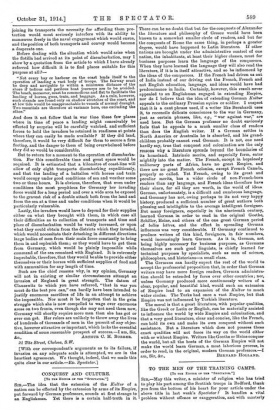CONQUEST AND CULTURE.
[To TIM EDITOR OP TILZ "SPECTATOR:] SIE,—The idea that the extension of the Sultur of a nation can be effected by the extension by arms of its Empire, put forward by German professors, sounds at first strange to an Englishman. Yet there is a certain half-truth in it. There can be no doubt that but for the conquests of Alexander the literature and philosophy of Greece would have been known to a somewhat smaller circle of readers, and but for the conquests of Rome the same thing, in perhaps a greater degree, would have happened to Latin literature. If other nations are brought under the administrative control of one nation, the inhabitants, at least their higher classes, must for business purposes learn the language of the conquerors. When they have learned the language they will also read the literature, if it is in itself attractive, and so be influenced by the ideas of the conquerors. If the French bad driven us out of India instead of our driving out the French, French and not English education, language, and ideas would have had predominance in India. Certainly, however, this result never appealed to an Englishman engaged in extending Empire, nor do I believe that the idea of extending German Kultur appeals to the ordinary Prussian squire or soldier. I suspect that it is a cant phrase used, if a writer like Bernhardi uses it to reconcile delicate consciences to the war in Germany, just as certain phrases, like, e.g., "war against war," are used here. But the German professor no doubt enviously feels that he appeals to a much smaller class of readers than does the English writer. If a German settles in North America or Australia he is absorbed, and his grand- children probably cannot read German. It is not, one need hardly say, true that conquest and colonization are the only reasons why a literature spreads beyond the boundaries of its homeland. Intrinsic merits, and especially form, enter mightily into the matter. The French, except in hopelessly unliterary parts of Africa, have no great Empire, and there are no great French colonies, except French Canada, properly so called. Yet French, owing to its great and peculiar merits, has a wider circle of non-French-born readers than any language, and French ideas therefore have their share, for all they are worth, in the world of idea& German, unfortunately, is a difficult and cumbrous language, and Germany has not, owing perhaps to its not very happy history, produced a sufficient number of great authors both pleasing and intelligible to the average intelligent foreigner. But many foreigners, especially in the nineteenth century, learned German in order to read in the original Goethe, Schiller, Heine, and others of the one great German period of belles lettres, and the effect in spreading German influences was very considerable. If Germany continued to produce writers of this kind, foreigners, in fair numbers, would increasingly learn German. As it is, German, not being highly necessary for business purposes, as Germans themselves are such good linguists, is chiefly learned for technical purposes by specialists, such as men of science, philosophers, and historians—a small class.
The Germans can hardly expect the rest of the world to accept the professorial proposition that, in order that German writers may have more foreign readers, German administra- tion should be extended by force over other countries ; nor, unless Germany produced more continuously writers of A clear, popular, and beautiful kind, would such an extension of Empire lead to an expansion of the Ezdtur to much wider circles. The Turks had once a vast Empire, but that Empire was not influenced by Turkish literature.
The moral is that a great literature, with popular qualities, like the Greek or Latin or English, can be materially assisted to influence the world by wide Empire and colonization, and that a very good literature, clear and concise, like the French, can hold its own and make its own conquest without such assistance. But a literature which does not possess these exact qualities will not force its way on the world either with or without Empire. Writers like Goethe or Heine conquer the world, but all the hosts of the German Empire will not make the world learn German, a most laborious process, in order to read, in the original, modern German professors.—I


































 Previous page
Previous page